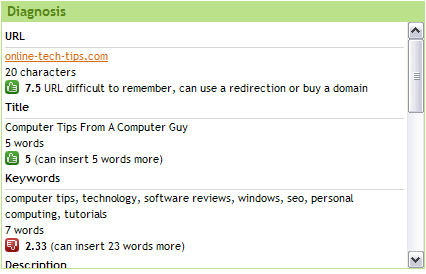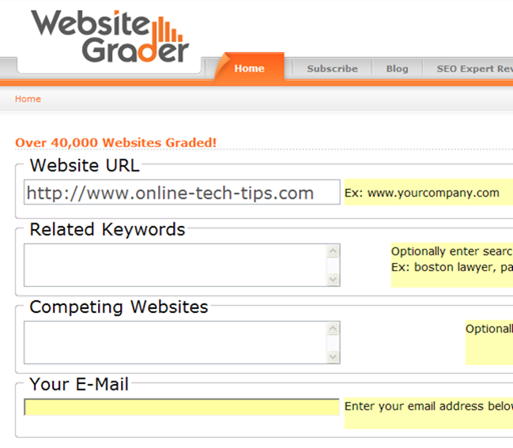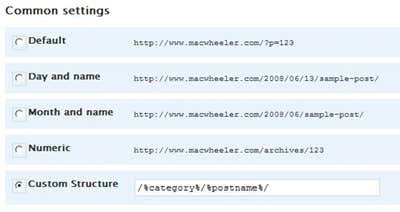SEO Tips: Use Google Trends to your advantage
 5:45 AM
5:45 AM
 Twitter Tools
Twitter Tools
 Posted in
seo
Posted in
seo
SEO Tip: Google Insights for Search
 5:45 AM
5:45 AM
 Twitter Tools
Twitter Tools
We have shown you here how to use Google Sets and Google Trends. Now from Google’s Tel Aviv team comes the Google Insights for Search which is currently in Beta stage: http://www.google.com/insights/search
 Posted in
seo
Posted in
seo
Basic WordPress SEO
 5:44 AM
5:44 AM
 Twitter Tools
Twitter Tools
Today I am going to look at some very basic first steps in making sure that your band new shiny WordPress installation is search engine friendly. I am going to talk about just two things, but these are very important things, the most fundamental and arguably the most valuable from an SEO viewpoint.
Firstly we are going to talk about permalinks. When you first install WordPress, your permalink structure will create a page URL for your posts and pages that looks something like this:
http://www.yoursite.com/?p=123
This is far from optimal, we really need to change this to something that contains some tasty and readable information for the search engines to devour. So we will make some changes to have them look like this:
http://www.yoursite.com/category/post-name/
To do this, find the permalinks section of your blog options and make the changes in the screenshot below. Before doing so, make sure you .htaccess file has write permissions set, don’t forget to change it back afterwards!
 Posted in
seo
Posted in
seo
Ultimate Keyword Analysis For Articles
 5:43 AM
5:43 AM
 Twitter Tools
Twitter Tools
 Posted in
seo
Posted in
seo
Get keyword ideas using the Google Keyword Tool
 5:42 AM
5:42 AM
 Twitter Tools
Twitter Tools
 Posted in
seo
Posted in
seo
Free Search Engine Optimization (SEO) Software by WEB CEO
 5:41 AM
5:41 AM
 Twitter Tools
Twitter Tools
In today’s article I am going to discuss a SEO software package that has become invaluable to me in recent months. It is an all-in-one SEM/SEO tool named WEBCEO and it is quite frankly the best SEO optimization tool I have ever used. And above all it is completely free! There is a paid version but everything I will show you here is possible with the free version.
I’m not going to talk about on the page optimization and search engine/directory submissions although the software does perform these functions. What I am going to go over today is using WEBCEO as a tool in an ongoing SEO project, I will cover the three areas of main concern for any SEO head when trying to monitor off the page issues affecting SERP. Namely keywords, rankings and back links.
 Posted in
seo
Posted in
seo
How to write blog post titles while keeping SEO in mind
 5:39 AM
5:39 AM
 Twitter Tools
Twitter Tools
How many times do you happen upon a post written by a fellow blogger whose title makes you wonder what the post will actually end up being about? Note that many times that you do run across these posts, they do not have a high PageRank or get very much traffic unless they have been Dugg, etc. And even if they do, could they get more traffic if their post title was optimized?
When I first starting writing for my blog in March of this year, I didn’t even know what the term SEO meant and hence wrote post titles that would make a seasoned blogger cringe! Even though I have read it over 100 thousand times, it seems that a lot of bloggers out there still don’t understand how important it is to write a good title for each post.
And what’s more baffling is that everyone intrinsically knows how important titles are because each person reads a newspaper on a daily basis. For example, if you were to whip open the New York Times web site right now, the top headline is as follows:
 Posted in
seo
Posted in
seo
SEO tips from Matt Cutts that every blogger should know
 5:38 AM
5:38 AM
 Twitter Tools
Twitter Tools
- Use plugins like Akismet or Math Comment Spam Protection to protect your blog from spammy links, etc that could hurt you.
- Place the Google Analytics code lower in your WordPress template, preferably in the Footer.php section. Moving the script code from the header into the footer will allow your page to load faster. You can put it anywhere in the footer file as long as it’s before the </body> tag.
- Replace the default Feedburner Feed with your own custom branded feed hosted off your own domain.
- Install an SEO title plug-in that will swap the name of your blog with the post title first. If your blog’s name is still first and then the post title, make sure you install something like Optimal Title immediately.
- Install and use WWW Redirect, Permalink Redirect, and Related Posts plugins if you have not already done so. The first plug-in will ensure that typing in your site with the WWW or without it will lead to the same place, whichever you choose. The second ensures that your post URL with or without a trailing slash works correctly. Lastly, Related Posts will include a list of other similar posts at the bottom of each post, thus helping maintain good internal link structure.
- If you’re just starting your blog, make sure you don’t put it at the root of the domain. Create a subdirectory called “blog” (not “Wordpress”) and use the root of the domain as an entry point with a link to your blog.
 Posted in
seo
Posted in
seo
Check your PageRank, rating, backlinks, and website using Xinu
 5:38 AM
5:38 AM
 Twitter Tools
Twitter Tools
Here’s a nifty tool that you can use to check your web site’s important SEO-related stats such as PageRank, links at social book-marking sites, indexed pages for the top search engines, and number of backlinks. This tool is targeted more towards helping your site overcome insufficiencies that you might have when ranking with search engines.
Xinu is a very simple to use, yet comprehensive tool to diagnosis or analyze a web site. It’s also a good way to get an idea of how your site compares to other sites in your niche.
Once you type in your domain name, check off the elements you want to see, and then click GO. You’ll first get an analysis of your URL, the Title tag of your web page, the keywords, the description, and the size of the HTML document.

 Posted in
seo
Posted in
seo
Website Grader – A free search engine optimization (SEO)/marketing tool
 5:37 AM
5:37 AM
 Twitter Tools
Twitter Tools
f you have your own web site or blog, it’s always good to know where you can improve the SEO aspects of your site so that you rank better in the SERPs. There are a few good tools out there that you can use to get specific recommendations for your site. I really like Website Grader because it checks many aspects of a site’s overall ranking including the site structure, meta tag usage, head tag usage, image summary, age of the domain, Google PageRank, Alexa rank, Technorati rank, readability of site, and inbound links.

 Posted in
seo
Posted in
seo
SEO’s please help me!? Should I try this crazy shit with my blog!?
 5:36 AM
5:36 AM
 Twitter Tools
Twitter Tools
Ok, I’m in a bit of a situation here and I need some serious SEO help!! Here’s what I’ve done…I decided to create a blog on Blogger Beta back in March and stupidly did not read about other blogger tools like Wordpress, etc that have more features and that can be used on your own domain name (I know Blogger allows this too, but I was dumb and didn’t know back then that a custom domain name is far better in terms of SEO).
So I started writing lots and lots of posts, but I was using the new label feature in Blogger completely wrong! Instead of making categories like Windows or MS Office, I was typing in full sentences like “Learn the basics of Excel” and only later on did I realize that if I wanted people to get to the posts easily, the labels were supposed to be like categories (I was thinking they were like keywords and I should put lots of keywords in there!!)…
So what did I do?? In the middle of April after writing more than a hundred or so posts, I went through each post and changed the labels so that they were aligned with categories and then I added that to the side menu of my blog! BAD IDEA!!! Google didn’t like this very much and suddenly most of my pages went to the supplemental index, even though they were all in the main index before I changed all the links.
And now it’s pissing me off because more than half my site is supplemental because of changing the internal link structure to make it easier for people to view my blog!!! So I’ve tried to do some research and I’ve come up with this idea…
1. Use meta tags (noindex, nofollow and noarchive) to try and get all my pages out of the index.
2. Then use the Google URL removal tool to take my whole site out of the index also.
3. Switch over to Wordpress after everything on the original blog is out of the index.
4. Delete the blog on Blogger and hope that my pages on the new site get re-indexed and that I don’t get penalized for duplicate content (which would send me right back into supplemental) because all of the original pages are gone.
How does this idea sound!?!? My blog is not that popular or anything and it’s only been around for about 2 and half months, so I’m thinking it’s a good time to try it. Unfortunately, I have a page rank of 4, but I’d rather have all my pages indexed and regain my page rank than sit here and keep writing shit that will only end up in the supplemental index!!!
SOMEONE TELL ME THE BEST WAY!! I need some hardcore SEO people…spare a minute please!
[tags]seo, moving from blogger to wordpress, switch blogging platforms, blogger to wordpress[/tags]
 Posted in
seo
Posted in
seo









